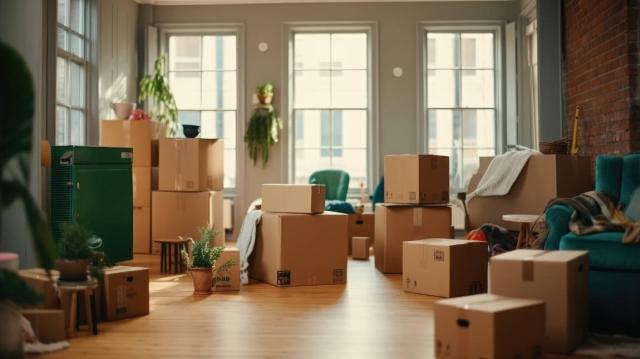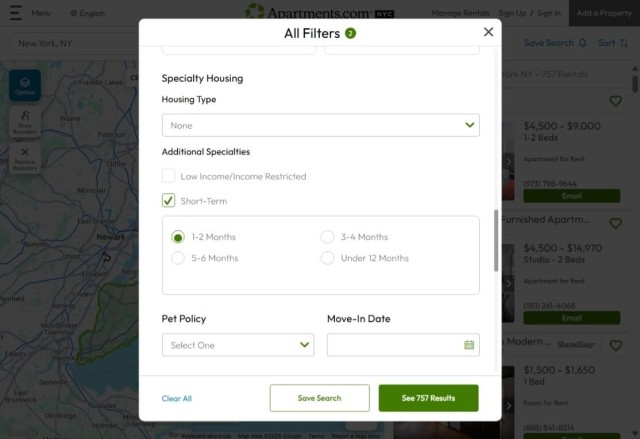Moving from a rental house to an apartment can be intimidating, but it's an exciting opportunity for a fresh start. Whether you’re downsizing or looking for a change, moving requires some serious planning. Below, you can find valuable tips to make the transition as easy as possible.
Renting a House vs. Renting an Apartment
Deciding to move from a rental house to an apartment is a significant step. Still, both options have their advantages and disadvantages, and understanding the key differences can help you make the most informed decision.
Space and Privacy
A rental house generally offers more space with a backyard, a large kitchen and a few bedrooms. An apartment typically has less square footage than a house, resulting in limited living space. If you value your outdoor space, apartments only offer balconies or patios. Sometimes, there could be an outdoor courtyard or garden, but usually, at an apartment, outdoor space is limited.
Maintenance
In a rental house, as a tenant, you are normally responsible for certain maintenance issues like changing a light bulb and lawn care. Your landlord may handle bigger issues, such as fixing the garbage disposal, but the maintenance request may not be addressed as quickly if your landlord has other responsibilities. In contrast, apartment communities have their own on-site maintenance team responsible for all maintenance, such as fixing a broken door or replacing a shower head. This eases any burden on tenants, especially since most apartments have an app or an online portal where you can report any maintenance requests.
Amenities
Rental houses don’t have on-site amenities like an apartment community. Apartment communities offer amenities like gyms, pools, and lounges.
Landlord vs. Property Management Company
Typically, a landlord owns the rental house and collects rent. In contrast, a property management company oversees the property on the owner’s behalf. Property management companies typically run apartment communities and usually create a more formal relationship between the property manager and tenant. Property management companies typically have an on-site maintenance team that can help with any of your repairs. Plus, property managers or maintenance may be easier to get in contact with during an emergency since there is a larger staff compared to a rental house that only has a landlord.
Choose the Perfect Apartment
Now that you've weighed the pros and cons and are sure about your decision to move from your rental house to an apartment, it's essential to start the process as soon as possible to be sure you can find the perfect apartment that fits all your needs. Apartment communities offer amenities such as pools, fitness centers, dog parks, and storage units. If you have pets, you want to find an apartment that is pet friendly. Luckily, if you search for your apartment on Apartments.com, you can use filters to find an apartment that has everything you need and want.
Plan Your Budget
Once your application has been accepted, it’s time to create your monthly budget. Financial advisors say the general rule of thumb is only to use 30% of your monthly income on rent. Before signing the lease, look at all additional costs, such as utilities and parking fees. If you cannot afford an apartment's other expenses, you may need to find a more affordable one.
Declutter and Downsize Before You Move
After you sign your lease agreement, it is time to start on your moving checklist and declutter your home to downsize before the big day. Most apartments have limited space compared to houses, so some of your existing furniture may not fit; therefore, measure your new place to see what will and won't work. If you discover some of your furniture will not fit in your new home, then donate it to a local consignment store or sell it to have some extra cash.
Plan the Move
Moving from a house to an apartment can be challenging due to the size difference. Start by considering hiring professional movers to help you with the heavy lifting or enlist a few friends and family members. If you hire professional movers, they usually come with their moving truck and sometimes pack and label your items. But if you decide to do it with friends and family, rent a moving truck and label your boxes clearly. Be sure to pack clothes for the night and toiletries separately so you can shower and hop in bed after a long day.
Be Mindful of Noise and Neighbors
Once you have moved in, you may have neighbors above or below you. Unlike your former house, if you walk too loudly, drop something, or play loud music, your neighbors can hear you, so be mindful and courteous. Building positive relationships with your neighbors can make apartment living much more enjoyable.
Invest in Multi-Functional Furniture
To maximize your apartment's space, consider investing in furniture that serves multiple purposes. Sofas with built-in storage, fold-down beds, and dining tables with leaves are great options. These pieces allow you to adapt your apartment to your changing needs.
Moving from a rental house to an apartment can be challenging, but if you do the proper planning, organizing and downsizing, you'll be settled in your next home in no time.






